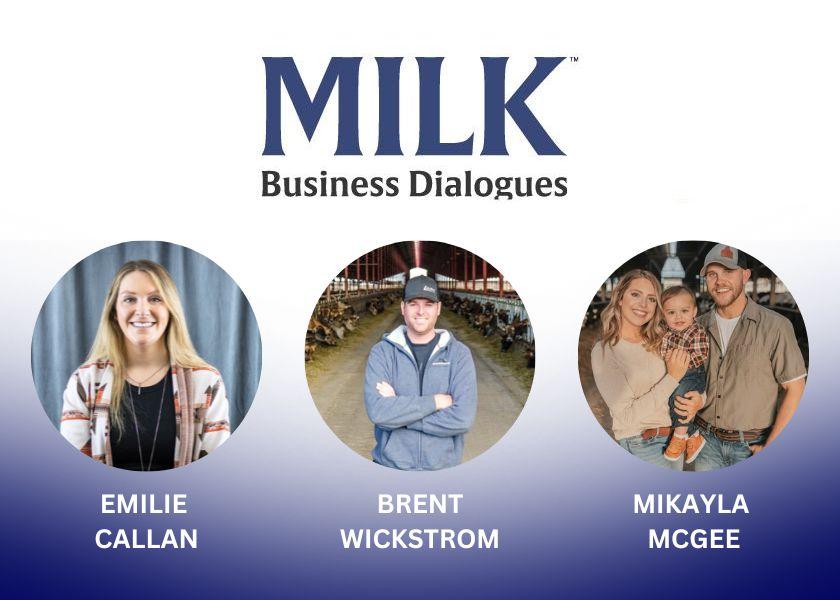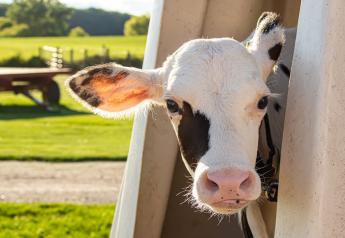The Road Back Home Began with Leaving for these Young Dairy Producers

Before we became the owners and operators of our farms, we had a decision to make. To venture down a different path and leave the family farm or return back to our roots knowing full well the road ahead would be riddled with challenges.
Recently on a Farm Journal Milk Business webinar, three dairy producers shared their journey back to the farm along with the challenges they’ve faced along the way.
Packing Their Bags
For today’s young dairy producers, the journey back home often starts with a trip to college to learn more about the entirety of the dairy industry. While nothing can replace the hands-on experience working on a farm generates, learning the ropes of the business portion of the farm can be immensely helpful. This held true for Brent Wickstrom of Wickstrom Jerseys in Hilmar, California.
“I kind of grew up like any other farm kid just following dad and grandpa around, so it’s always been in the forefront of my mind to come back to the farm and follow in their footsteps,” Wickstrom says.
The central valley dairy farmer milks 3,600 Jerseys on two separate facilities and is a partner on another dairy facility an hour down the road where they milk 5,500 animals. Before returning back to the farm, Wickstrom spent five years attending college at California Polytechnic State University but chose to spend his summers back home learning the ins and outs of his family’s operation.
“It took that growing up and college experience to really solidify that [dairy farming] is what I wanted to do, and my family was really good about saying ‘You don’t have to come back if you don’t want to. Make sure it’s something that you’re passionate about,’ and that really helped me before I made the commitment.”
On the opposite side of the country, Emilie Callan, a dairy farmer located in Avon, New York, shares a similar story.
“I went to Cornell University for animal science and did four internships while I was there,” she says. “I went away to college knowing that I wanted to come home [to the farm], but I also knew I wanted to come away with experiences from different farms and learn from different managers. While I was there, I learned about other parts of the [dairy] industry as well as learning how different [farm managers] manage their people and farms.”
Two years after graduation, Callan received word that her family’s farm manager was leaving. Faced with the decision to stay at her current job or return to her family’s operation, Callan strapped on her farm boots and headed home.
“The timing was pretty perfect that I came home and took over that role,” Callan notes.
Towards the central part of the country, Mikayla McGee of Jon-De Farm, Inc. in Baldwin, Wisconsin, relates to both Wickstrom and Callan.
“I always knew at some point I would come back,” McGee says. “I went off to college, did some internships, then worked on a few farms for a little bit after college. Then, there happened to be an opening back at our home farm and I made the decision to take that.”
New Experiences
While all three producers had an inkling early on that they would return home, all say the experiences and opportunities they dived into during their college years helped prepare them for the challenges they would face on the road ahead.
“College really helped prepare me,” Wickstrom says. “I’ve always highly recommended people go to college and get away from the farm for a little bit if they can to spread their wings.”
While Wickstrom didn’t participate in any internships during his time away from the farm, he notes that the experiences he gained during college still impact him today.
“I majored in dairy science and minored in agri-business and crop science, and I probably took the most away from the ag business side. In this modern era of farming, a lot of the work we do is unfortunately in the office working on financials. So that’s probably the biggest experience I gained in college.”
For McGee, working on other farms and participating in internships was the most valuable aspect of her college experience.
“Looking back now as a manager, even in the jobs and the internships that I didn’t like that much I always took something away from it,” she notes. “I’d think to myself, ‘Okay, I don’t want to be that type of manager in the future,” and note what did and didn’t work well on the farms I worked at, and for me, that was really helpful.”
Out east, Callan notes that the networking experiences and making life-long friends was an important part of her journey but says the internships portions are what taught her some of the most valuable life lessons.
“I worked at one farm for two years and really took away a lot about managing people, and a lot of what I do now is human resource management, training employees and knowing how to communicate in the best way with our employees. So that experience was really helpful.”
While college is not a requirement to become a dairy farmer, it can provide tactful information and experiences to be used for years to come. Something all three of this young dairy producers can attest too.
To listen to the entire conversation with these three producers and learn more about their road back home, click here: The Role of Young Dairy Producers







